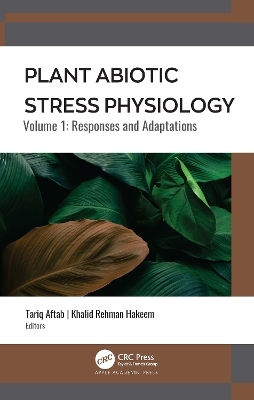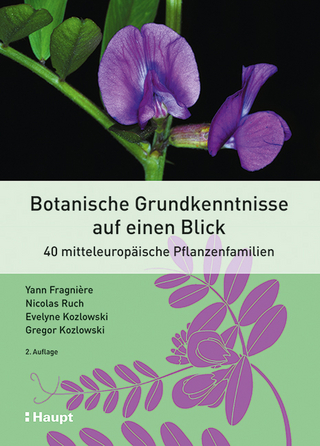
Plant Abiotic Stress Physiology
Apple Academic Press Inc. (Verlag)
978-1-77463-017-4 (ISBN)
This two-volume set highlights the various innovative and emerging techniques and molecular applications that are currently being used in plant abiotic stress physiology. Volume 1: Responses and Adaptations focuses on the responses and adaptations of plants to stress factors at the cellular and molecular levels and offers a variety of advanced management strategies and technologies. Volume 2: Molecular Advancements introduces a range of state-of-the-art molecular advances for the mitigation of abiotic stress in plants.
With contributions from specialists in the field, Volume 1 first discusses the physiology and defense mechanisms of plants and the various kinds of stress, such as from challenging environments, climate change, and nutritional deficiencies. It goes on to discuss trailblazing management techniques that include genetics approaches for improving abiotic stress tolerance in crop plants along with CRISPR/CAS-mediated genome editing technologies.
Volume 2 discusses how plants have developed diverse physiological and molecular adjustments to safeguard themselves under challenging conditions and how emerging new technologies can utilize these plant adaptations to enhance plant resistance. These include using plant-environment interactions to develop crop species that are resilient to climate change, applying genomics and phenomics approaches from the study of abiotic stress tolerance and more.
Agriculture today faces countless challenges to meet the rising need for sustainable food supplies and guarantees of high-quality nourishment for a quickly increasing population. To ensure sufficient food production, it is necessary to address the difficult environmental circumstances that are causing cellular oxidative stress in plants due to abiotic factors, which play a defining role in shaping yield of crop plants. These two volumes help to meet these challenges by providing a rich source of information on plant abiotic stress physiology and effective management techniques.
Tariq Aftab, PhD, is currently an Assistant Professor in the Department of Botany at Aligarh Muslim University, India, where he earned his PhD. He is the recipient of a prestigious Leibniz-DAAD fellowship from Germany, a Raman Fellowship from the Government of India, and a Young Scientist Awards from the State Government of Uttar Pradesh (India) and Government of India. After completing his doctorate, he worked as Research Fellow at the National Bureau of Plant Genetic Resources, New Delhi, and as Postdoctorate Fellow at Jamia Hamdard, New Delhi, India. Dr. Aftab was also a Visiting Scientist at the Leibniz Institute of Plant Genetics and Crop Plant Research (IPK), Gatersleben, Germany, and in the Department of Plant Biology, Michigan State University, USA. He is a member of various scientific associations from India and abroad. He has edited seven books with with international publishers, including Elsevier Inc., Springer Nature and CRC Press (Taylor & Francis Group); co-authored several book chapters, and has published over 60 research papers in peer-reviewed international journals. His research interests include physiological, proteomic, and molecular studies on medicinal and aromatic plants. Khalid Rehman Hakeem, PhD, is Professor at King Abdulaziz University, Jeddah, Saudi Arabia. After completing his doctorate (botany; specialization in plant eco-physiology and molecular biology) from Jamia Hamdard, New Delhi, India, he worked as a lecturer at the University of Kashmir, Srinagar, India, at Universiti Putra Malaysia, Selangor, Malaysia, he was a Postdoctorate Fellow and Fellow Researcher (Associate Professor) for several years. Dr. Hakeem has more than 10 years of teaching and research experience in plant eco-physiology, biotechnology and molecular biology, medicinal plant research, plant-microbe-soil interactions, as well as in environmental studies. He is the recipient of several fellowships at both national and international levels. He has served as a visiting scientist at Jinan University, Guangzhou, China. Currently, he is involved with a number of international research projects with different government organizations. To date, Dr. Hakeem has authored and edited more than 60 books with international publishers. He also has to his credit more than 115 research publications in peer-reviewed international journals and 55 book chapters in edited volumes with international publishers. At present, Dr. Hakeem serves as an editorial board member and reviewer for several high-impact international scientific journals. He is included in the advisory board of Cambridge Scholars Publishing, UK. He is also a fellow of the Plantae group of the American Society of Plant Biologists, member of the World Academy of Sciences, member of the International Society for Development and Sustainability, Japan, and member of the Asian Federation of Biotechnology, Korea.
1. Innovations in Crop Production: An Amalgamation of Abiotic Stress Physiology and Technology 2. Redox Homeostasis Managers in Plants under Environmental Stresses 3. Reactive Oxygen and Nitrogen Species: Oxidative Damage and Antioxidative Defense Mechanism in Plants under Abiotic Stress 4. Physiological Mechanisms of Plants Involved in Phosphorus Nutrition and Their Deficiency Management 5. Responses and Adaptation of Photosynthesis and Respiration under Challenging Environments 6. Forward and Reverse Genetics Approaches for Improving Abiotic Stress Tolerance in Crop Plants 7. Salinity-Induced Changes on Different Physiological and Biochemical Features of Plants 8. Next-Generation Climate Resilient Agricultural Technology in Traditional Farming for Food and Nutritional Safety in the Modern Era of Climate Change 9. CRISPR/CAS-Mediated Genome Editing Technologies in Plants 10. Use of Ornamental Plants for the Phytoremediation of Metal Contaminated Soils 11. Role of Electromagnetic Radiations in Abiotic Stress Tolerance
| Erscheinungsdatum | 18.02.2022 |
|---|---|
| Zusatzinfo | 21 Tables, black and white; 5 Illustrations, color; 23 Illustrations, black and white |
| Verlagsort | Oakville |
| Sprache | englisch |
| Maße | 156 x 234 mm |
| Gewicht | 948 g |
| Themenwelt | Naturwissenschaften ► Biologie ► Botanik |
| Naturwissenschaften ► Biologie ► Genetik / Molekularbiologie | |
| Weitere Fachgebiete ► Land- / Forstwirtschaft / Fischerei | |
| ISBN-10 | 1-77463-017-6 / 1774630176 |
| ISBN-13 | 978-1-77463-017-4 / 9781774630174 |
| Zustand | Neuware |
| Informationen gemäß Produktsicherheitsverordnung (GPSR) | |
| Haben Sie eine Frage zum Produkt? |
aus dem Bereich


